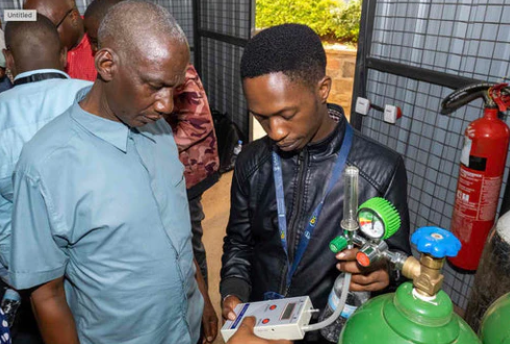Introduction
Oxygen analyzers are essential tools for confirming the oxygen output of these systems, ensuring that patients receive the required oxygen levels. However, many low- and middle-income countries (LMICs) face challenges in providing equitable access to oxygen and gas detection equipment. Build Health International (BHI) has been working to address this issue by offering expertise, collaboration, and equipment to create sustainable oxygen access and improve gas detection capabilities, ultimately enhancing patient care and safety in healthcare settings across LMICs.
Pros |
Cons |
|
✅ Oxygen analyzers can cost as little as $300. ✅ Ultrasonic oxygen sensors last for over 5 years. ✅ Oxygen is the gas of life and is abundant at 20.9%. Oxygen concentrators can further elevate O2 levels. |
⛔ Oxygen can be displaced and becomes dangerous to life when less than 19.5%. ⛔ Oxygen can become dangerous at both low and enriched levels - precaution is needed. ⛔ Highly accurate oxygen sensors can be expensive. |
Best Oxygen Analyzer for Oxygen Concentrators?
The Forensics Detectors Oxygen Analyzer stands out as a top choice for oxygen measurement, featuring ultrasonic sensor technology, maintenance-free operation with factory calibration, and a durable design with ABS plastic housing. Its rechargeable battery offers extended use, while the large digital display and oversized buttons ensure easy operation for all users, making it particularly reliable for monitoring oxygen concentrators and generators.
- Forensics Detectors Oxygen Analyzer for Oxygen Concentrators
- Yokogawa Oxygen Analyzer
- Nova Analytic Oxygen Analyzer
Importance of Oxygen Access and Oxygen Analyzers
The World Health Organization defines oxygen as essential medicine, as it is critical for the treatment of many health complications, including respiratory failure, pneumonia, and sepsis. However, many healthcare facilities in LMICs lack reliable access to oxygen, leading to increased rates of patient illness and death. This problem has been exacerbated by the COVID-19 pandemic, where oxygen systems in many healthcare settings have become overwhelmed. Oxygen systems include oxygen analyzers to confirm the effectiveness of oxygen concentrating machines.
The Three Factors of Oxygen Access
To provide sustainable oxygen access, three factors are necessary: expertise, collaboration, and equipment. BHI has been working to provide all three factors to healthcare facilities in LMICs. Their team of traveling biomedical engineers provides assessments and repairs to existing oxygen infrastructure, allowing facilities to run at their full capacity.

Building Long-Term Sustainability
BHI's team of public health experts, biomedical engineers, and global partners work to change the landscape of how equitable and sustainable oxygen access is delivered to patients who need it most. They provide education and training to on-the-ground technicians who work at healthcare facilities in LMICs. This approach ensures that the very workforces responsible for assessing and repairing systems have the necessary biomedical knowledge and skills to maintain and repair the systems.
Can You Detect The Smell Of Medical-Grade Oxygen Used In Healthcare Facilities?
No, pure medical-grade oxygen is completely odorless. If you detect a smell from medical oxygen equipment, it could indicate contamination or equipment problems requiring immediate attention.
BHI's Recent Efforts
BHI's recent efforts have focused on equipping and training on-the-ground technicians. They organized an oxygen educational training in Rwanda, which underlined an upstanding commitment to knowledge sharing and sustainability. BHI worked with the Rwanda Biomedical Centre (RBC), the Rwandan Ministry of Health, and Jhpiego to deliver three individual weeklong trainings to 68 biomedical technicians and employees representing 28 different healthcare facilities in Rwanda.
Pedro Castro, who supported training efforts for Build Health International, reflected on the impact of the training for the participants. He stated that the trainees were grateful for the opportunity to learn and emphasized the importance of teaching technicians how to use the devices they were given. This training is an essential part of ensuring sustainability and maximum efficiency of the oxygen systems.
During the training, BHI staff covered the fundamentals of oxygen access, including pressure swing adsorption (PSA) basics, preventive maintenance, and troubleshooting common problems. The training also emphasized occupational hazards and safety, including proper protocols for repairs and the use of personal protective equipment (PPE) to ensure that hospital staff are equipped to undertake repairs in safe conditions. Lastly, the training emphasized how to properly use tools, including how to use oxygen analyzers.
Partners who Make it Work
BHI's various global partners, from on-the-ground organizations to world-scale funders, to those who source and equip necessary parts to healthcare facilities, make this work largely possible. One such partner is Forensics Detectors, a supplier that is changing how oxygen is delivered in the regions where BHI works. Based in California, Forensics Detectors has equipped BHI with 31 analyzers at a discounted market rate, to be distributed to hospital staff at 31 different facilities throughout Sub Saharan Africa.
Oxygen analyzers are used by biomedical engineers to calculate the amount of available oxygen during an assessment. Using scale readings, analyzers determine and confirm oxygen concentration, flow, and pressure needed to operate a system. A high-quality oxygen analyzer can be used in a variety of healthcare settings, ranging from smaller clinical spaces to large district hospitals that provide services to thousands.

Final Words
Gas detection is vital for ensuring the safety and effectiveness of oxygen systems, particularly in the context of treating patients with COVID-19 and other respiratory conditions. Oxygen analyzers are essential tools for monitoring the oxygen concentration in these systems, allowing healthcare providers to optimize treatment and prevent potential hazards. However, low- and middle-income countries (LMICs) often face challenges in accessing reliable gas detection equipment and maintaining sustainable oxygen supplies. Build Health International (BHI) is addressing this issue by providing expertise, collaboration, and equipment to improve gas detection capabilities and create sustainable oxygen access in LMICs, ultimately enhancing patient care and outcomes in these resource-limited settings.
About the Author
Dr. Kos Galatsis ("Dr.Koz") is the President of FORENSICS DETECTORS, where the company operates from the scenic Palos Verdes Peninsula in Los Angeles, California. He is a subject matter expert on gas sensor technology, gas detectors, gas meters, and gas analyzers. He has been designing, building, manufacturing, and testing toxic gas detection systems for over 20 years.

Every day is a blessing for Dr. Koz. He loves to help customers solve their unique problems. Dr. Koz also loves spending time with his wife and his three children going to the beach, grilling burgers, and enjoying the outdoors.
Read more about Forensics Detectors here.
Email: drkoz@forensicsdetectors.com

